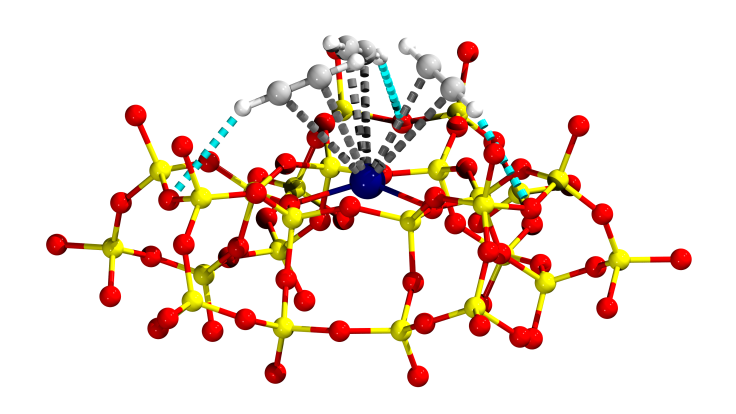
Adsorption Configuration of Acetylene on Ni@FAU zeolites
Nankai News reported (Reporter Ma Chao) Cooperating with the University of Manchester, Dalian Institute of Chemical Physics (DICP) of the Chinese Academy of Sciences, Rutherford Appleton Laboratory, Oak Ridge National Laboratory and other scientific research institutions, the School of Materials Science and Engineering of Nankai University (NKU) has made significant progress in the study on gas separation by adsorption processes, with the related outcome "Control of zeolite pore interior for chemoselective alkyne/olefin separations" published in Science on May 29, for which NKU is the first signed affiliation, and the researcher Li Landong from NKU and Dr. Yang Sihai from the University of Manchester are co-authors.
Light olefins, represented by ethylene and propylene, are the most basic raw materials in chemical industry, with a global capacity of nearly 400 million tpa, which are mainly used to produce important chemicals such as synthetic fibers, rubber and plastics. In the production of light olefins, a few alkyne impurities will be introduced, which have a great impact on its polymerization and subsequent processing. Now, the purification of light olefins is the largest and most important chemical separation process in the world. Porous adsorption materials represented by metal-organic frameworks can selectively adsorb alkynes for alkyne/olefin separation, which is expected to replace the costly and cumbersome selective hydrogenation process. However, it is hard to achieve both high adsorption capacity and high separation selectivity for the alkyne/olefin separation based on the complex interaction between alkyne/olefin molecules and porous adsorption materials, which is a challenge in this field. Moreover, the cyclic stability and cost of porous adsorption materials will further restrict their industrial applications.
To solve these problems, researchers designed and constructed coordinatively unsaturated centers confined in FAU zeolites by using cheap and available materials, realized chemoselective alkyne/olefin separation, and presented a new adsorption separation strategy based on chemical bonds, which radically solves the problem in providing both high adsorption capacity and high separation selectivity and has methodological adaptability. The new strategy of alkynes/olefins separation based on chemical bonds put forth in the study is expected to promote the application of molecular sieve (zeolites) in related industrial adsorption separation processes; through advanced spectroscopy techniques, the specific chemical behavior of small molecules in confined space can be revealed from molecular, cluster, surface and interface levels, offering a new idea for the design and development of adsorption catalytic materials.
Related work has been supported by NSFC and NKU’s Training Program of 100 Young Academic Leaders.
Link to the Paper: https://science.sciencemag.org/content/368/6494/1002
